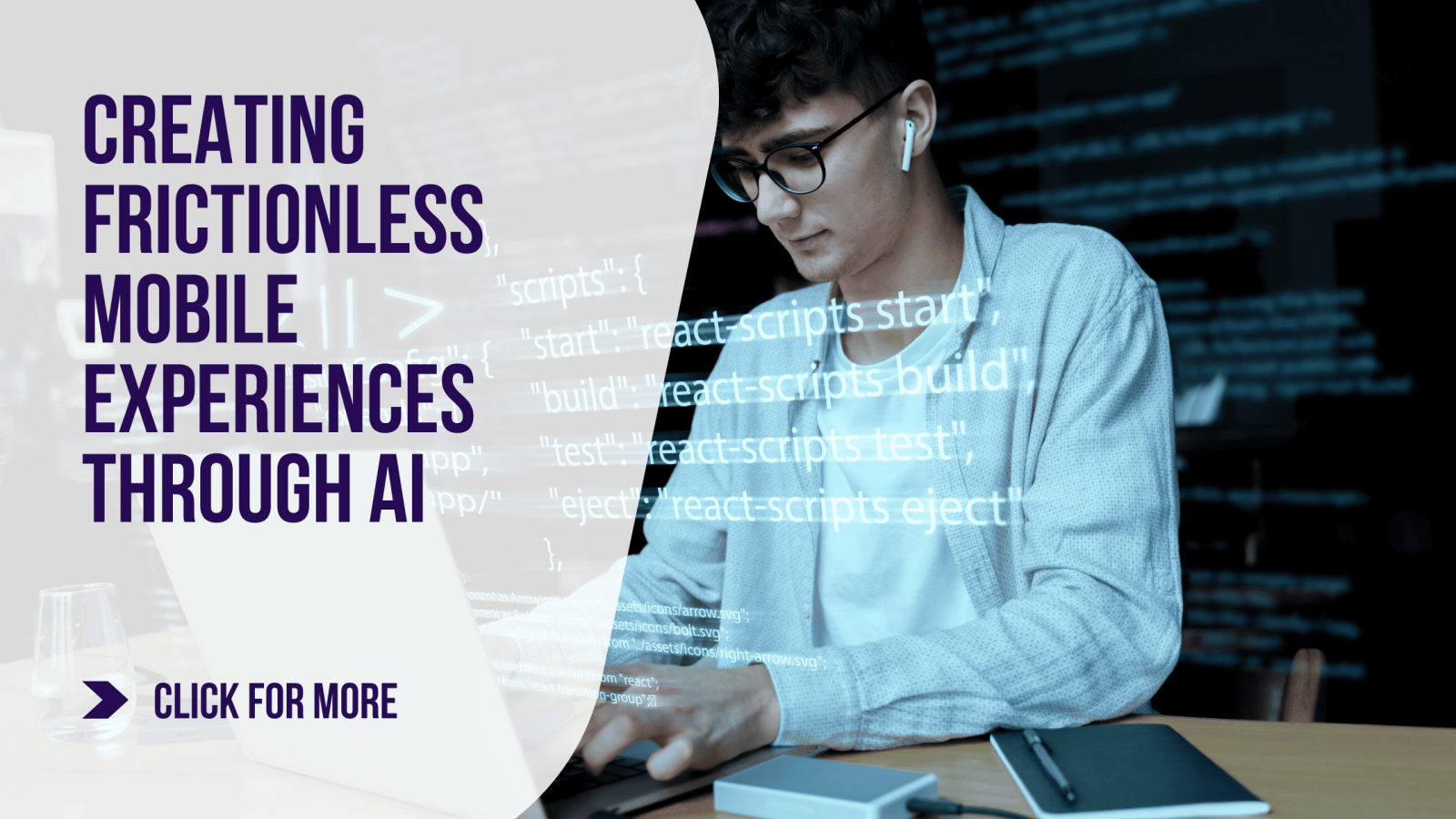Notifications

11 minutes, 22 seconds
-130 Views 0 Comments 0 Likes 0 Reviews

Mobile apps have transformed the way we live, work, and connect. Yet, for all their ubiquity, many apps still struggle with one key challenge: creating truly frictionless user experiences. It’s not enough to have flashy designs or feature-packed interfaces if users feel bogged down by complexity, slow responses, or confusing navigation. This is where Artificial Intelligence (AI) steps in—not as a buzzword, but as a practical solution shaping the future of mobile usability.
This blog takes you on a revealing journey into how AI is dismantling friction points in mobile apps, creating smoother, faster, and more intuitive experiences. It’s a story grounded in real-world applications and honest insights—not hype. So, buckle up and let’s explore how AI is quietly rewriting the rulebook of mobile app development.
Before we dive into AI’s role, let’s define what friction means in the context of mobile apps. Friction occurs whenever a user encounters resistance—whether it’s slow loading times, excessive taps, unclear directions, or unpredictable behavior. These little annoyances add up and can cause frustration, leading users to abandon the app altogether.
Friction can appear anywhere: onboarding processes that drag on, search features that return irrelevant results, or navigation paths that confuse rather than guide. The end goal? Remove or drastically reduce these barriers so users accomplish their goals effortlessly.
Traditional app development can only go so far in eliminating friction. Static designs and fixed workflows don’t adapt well to diverse user behaviors and preferences. AI, on the other hand, thrives on adaptability.
By continuously analyzing user interactions, AI learns what works and what doesn’t. It then dynamically adjusts the app’s behavior—offering personalized shortcuts, smarter suggestions, and faster responses. The result? Users experience an app that feels tailored to them, anticipating needs without making them think twice.
Personalization is often cited as a benefit of AI, but it’s more than just a buzzword—it’s a friction-fighter. AI-driven personalization tailors content, layout, and functions based on user behavior, preferences, and context.
For example, imagine a shopping app that highlights categories you browse most, surfaces deals relevant to your past purchases, and rearranges menus to put your favorite brands upfront. These small adjustments streamline your journey, cutting down time spent searching and increasing satisfaction.
Personalization powered by AI moves beyond static preferences and evolves in real time, adjusting as user behavior changes, keeping the experience fresh and relevant.
Onboarding is the first impression—and one of the biggest friction points for new users. Long sign-up forms, unclear instructions, or overwhelming tutorials can easily push users away.
Here, AI offers elegant solutions like progressive profiling—asking for information gradually as users engage rather than upfront. AI chatbots can guide new users interactively, answering questions instantly without leaving the app.
Moreover, AI can analyze a user’s initial interactions and adapt the onboarding flow accordingly, simplifying steps for tech-savvy users or providing more guidance for novices.
One of the most common pain points in apps is search and navigation. Poorly designed search features that return irrelevant or outdated results are a direct source of frustration.
AI tackles this by employing natural language processing (NLP) and contextual understanding. Users can type or speak queries in everyday language, and AI interprets intent rather than just matching keywords. It can even anticipate what you’re looking for before you finish typing, speeding up the process.
Similarly, AI can optimize navigation paths based on user patterns, suggesting shortcuts or rearranging menus dynamically to highlight frequently accessed features.
Imagine an app that doesn’t wait for you to act but predicts what you need next. This is where predictive AI logic shines.
For instance, a calendar app might remind you of an upcoming meeting with travel time suggestions based on traffic conditions. A messaging app could suggest replies based on conversation context, speeding up communication.
These proactive features reduce the number of steps users must take, smoothing out the journey and making interactions feel effortless.
Static user interfaces can feel rigid and impersonal. AI enables adaptive interfaces that adjust to user preferences and context in real time.
Consider font size adjustments based on lighting conditions or dynamic button placements tailored to thumb reach for better ergonomics. AI can even detect when a user is distracted or multitasking and simplify the interface accordingly.
Such fluid interfaces reduce cognitive load and physical effort, key ingredients for frictionless experiences.
AI-powered voice recognition and gesture controls are becoming increasingly mainstream, allowing users to interact with apps more naturally and hands-free.
These modes of interaction reduce friction by bypassing traditional UI elements like keyboards or touchscreens, which can be cumbersome in certain situations—think cooking while following a recipe app or navigating a map while driving.
By integrating voice and gesture AI, apps become more accessible and convenient.
Friction often arises from errors—wrong inputs, failed transactions, or miscommunications. AI can minimize these through real-time validation, smart error correction, and predictive typing.
On the support front, AI chatbots offer instant help, resolving common issues without the need for human intervention. This immediacy prevents frustration from escalating and keeps users engaged.
Nothing kills a mobile experience faster than lagging or crashing. AI contributes behind the scenes by monitoring app performance and user behavior to optimize resource usage.
For example, AI can predict peak usage times and pre-load data accordingly, or intelligently manage battery consumption by adjusting app functions based on device state.
This proactive performance tuning ensures users enjoy smooth and reliable experiences.
While AI thrives on data, frictionless experiences must never come at the cost of user trust. Handling personal information responsibly is crucial.
Transparency about data collection, giving users control over settings, and using anonymized or on-device processing wherever possible are best practices.
Building trust through ethical AI use reduces user hesitation and fosters loyalty.
From a developer’s point of view, incorporating AI to create frictionless experiences is both an opportunity and a challenge.
Designing AI models that truly understand diverse user behaviors requires quality data and careful testing. Avoiding over-engineering and keeping AI features interpretable are essential to maintain usability.
Yet, the payoff is substantial—apps that delight users and stand out in a crowded marketplace.
Consider the ride-sharing apps that use AI to optimize routes, predict demand, and provide estimated arrival times, making the entire process seamless. Or streaming services that curate personalized playlists based on listening habits, removing the friction of choice paralysis.
These examples underscore how AI-driven friction reduction isn’t theoretical—it’s happening now, enhancing millions of mobile interactions daily.
Looking ahead, AI’s role in creating frictionless mobile experiences will deepen with advances in augmented reality (AR), biometric authentication, and edge computing.
Imagine apps that adapt instantly to environmental cues, authenticate users seamlessly via face or voice, and run AI models locally to preserve privacy and speed.
The future of mobile apps is not just smart—it’s intuitively frictionless.
Creating frictionless mobile experiences is no longer a luxury—it’s a necessity. AI provides the tools to break down barriers, simplify interactions, and anticipate user needs without adding complexity.
If your goal is to develop mobile apps that users don’t just tolerate but genuinely enjoy, incorporating AI thoughtfully is the way forward. For those seeking expert guidance, partnering with experienced mobile app developers in Atlanta can help turn this vision into reality—crafting apps that are as seamless as they are smart.
Mobile App Developer mobile app developers atlanta hire mobile app developer mobile app developers in Atlanta

